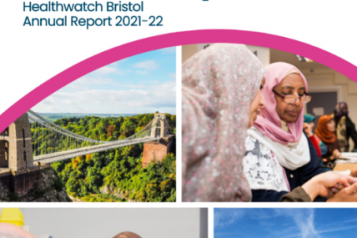Disabled people being left behind due to a lack of accessible healthcare information

As part of the Your Care, Your Way campaign, which ran between March and May 2022, Healthwatch England asked the public about their experience of getting accessible health and care information. Examples of accessible formats includes Braille, British Sign Language, and easy read.
People who responded to the campaign had a range of conditions, including sight loss, hearing loss, mental health challenges, and learning disabilities. The aim of the campaign was to help NHS and social care decision makers hear what is working and what could be improved from the public's perspective.
Key findings
One in four respondents (28%) – including deaf people, blind people and people with learning disabilities – said they had been refused help when requesting support to understand information about their healthcare.
Not being given information in the right format affected people’s mental health and wellbeing (38%), meant they missed out on important information about their health (29%) or meant that they could not contact a service they needed (27%).
Respondents reported that the quality of communication from NHS and social care services had worsened over the last two years. Two-thirds (67%) felt that the way health and care services communicate with them had gotten worse or slightly worse over the course of the pandemic.
Healthwatch England also sent Freedom of Information requests to NHS organisations across the country to find out how many meet the Accessible Information Standard (AIS). 139 organisations responded:
- Only a third (35%) fully meet the standard.
- Only 53% of NHS services said they ask patients about their accessible information needs when they first contact them.
- Only 36% of NHS organisations had undertaken work in the last three years to find out if they’re meeting the Accessible Information Standard.
We received responses from University Hospitals Bristol and Weston NHS Foundation Trust (UHBW), South Western Ambulance Service NHS Foundation Trust (SWAS), and Avon and Wiltshire Mental Health Partnership NHS Trust AWP.
UHBW said the Trust was meeting the Accessible Information Standard , and that: "A review of our compliance with AIS was undertaken in 2019 which provided an action plan. We are currently in the process of refreshing our approach to AIS compliance in the Trust."
SWAS said: "The Trust is currently undergoing an audit and thorough gap analysis of its accessible communications policies, protocols and current procedures."
AWP said the Trust was meeting the AIS, and that: "we assess, monitor and report on compliance via our AIS Steering Group and are currently reviewing all our Easy read literature against good practice guidelines. The Trust is in the process of relaunching our website which will be fully compliant with digital accessibility standards."
We are waiting for a response from North Bristol Trust (NBT).
What is the Accessible Information Standard?
The Accessible Information Standard gives you the right to be given information and communication support when using health and care services.
If you have a disability, impairment or sensory loss, or are a parent or carer of someone who does, you should expect:
-
To contact and be contacted by services in ways you find accessible
-
Services to give information and correspondence in formats you can read and understand
-
To be supported at appointments if needed.
-
Health and care services to support you to communicate.
Click to find out more on the Healthwatch England website.
Share your experience of asking for information in an accessible format by clicking the pink 'Talk to us' button below and filling in our short feedback form.


